Q&A: ‘Class’ creator Patrick Ness on building a school drama in the middle of the ‘Doctor Who’ universe
There’s nothing quite like the friendship forged between teenage classmates with the shared responsibility of protecting their school (and the world) from inter-dimensional alien threats.
Created by author Patrick Ness, “Class” follows the adventures of a group of students, and their teacher, who discover the fabric of space and time has worn rather thin at the exact place their school happens to be located. After surviving an alien attack, the “Class” is tasked by a certain Time Lord to keep watch over their school, Coal Hill Academy.
However Ness, who wrote every episode of the “Doctor Who” spinoff, explained that creating authentic teenage characters always took precedence over the timey wimey adventures that come with setting a series in the Whoniverse.
“[Teenagers are] stronger than you think and they’re kinder than you think and they volunteer more than you think and they’re more interested and curious and just more than you think,” said Ness. “That’s where it began.”
(Warning: Spoilers for the premiere episode of “Class” follow.)
The core characters in “Class” include Charlie (Greg Austin), an alien prince living as a human on Earth after losing his people and his home world; April (Sophie Hopkins), a seemingly ordinary student who proves most extraordinary in her convictions and resilience; Tanya (Vivian Oparah), a genius who was skipped ahead three years at school; Ram (Fady Elsayed), a star soccer player with a sensitive side; Matteusz (Jordan Renzo), Charlie’s human prom date; and Miss Quill (Katherine Kelly), the only other alien survivor of Charlie’s planet bound to the alien prince against her will as punishment for leading a rebellion against his people.

While crafting “Class,” Ness pulled from personal experiences growing up. The showrunner was a year younger than most of his school colleagues, similar to Tanya, who is three years younger than her “Class” mates. And the alien prince Charlie “is the hero I always wanted to see as a teenager but I never did,” Ness explained over the phone to The Times.
But April was the one who started it all. Ness described her as “the heart fairy” of the story.
In addition to being big-hearted, April acquires a specific alien problem of her own when the Shadow Kin — the race responsible for the extermination of Charlie and Miss Quill’s people — track the pair of alien refugees to Coal Hill.
A thwarted attempt to vanquish the king of the Shadow Kin results in April’s heart being shared between the two. This unique link between their lives becomes one of the central elements of the show’s first season.
What was an initial idea for “Class”?
My first idea was the sharing of a heart. The heart that beat on every other beat.
I really liked the idea of this extremely powerful leader of this army, being influenced by this teenage girl [April], and, what do you know, she’s his match. She’s not afraid of him. She’s kind of as powerful as he is, in a way. That felt really, really compelling.
It’s like what [April] says in the pilot, that “people’s lives are on a knife’s edge.” That’s what it feels like to be a teenager. I felt that as a center to the show [it] felt really, really great and true and right.
What do you think it is about high school and this age range that lends itself to be told as a scary monster story?
Being a teenager is the very first time you have stepped away from your family and you are saying: “I am not my family. I’m an individual. I am myself and I am separate from you.”
That’s a necessary action that has to happen to grow up. It’s a terrifying action and a violent action, in a way, because you’re stepping away from everything you’ve known.
It’s also a lonely action because you are, until you find your tribe, until you find the people who can understand you, you’re kind of alone.
That’s why it’s such a compelling place to tell stories.
The emotions are big. It’s where you are pressing your boundaries to find what your limitations are, what you believe in. What happens if you go over a boundary and when you bump up against a taboo? What are you going to do, what kind of decisions are you going to make?
We learn, and I think we learn to our fault, we learn to take our emotions a bit cynically. A teenager takes their emotions quite seriously because they are testing them out. It’s extremely powerful in storytelling.
Love can break your heart when you’re a teenager. It really, really, really can. It’s just as brave to say “I love you” to someone when you’re 16 as it is to save the world.
See the most-read stories in Entertainment this hour »
It’s just as brave to say ‘I love you’ to someone when you’re 16 as it is to save the world.
— Patrick Ness
Were you afraid of getting too dark?
You have to earn absolutely everything or your audience is going to smell a fake, but I’m certainly not afraid of going dark. All you have to read is the fiction that teenagers write themselves.
If you assign a class of 10th-graders to write short stories, they’re going to write just the darkest, most violent, bleak [stories] and that’s OK. I think that’s absolutely fine because that’s when you’re testing your boundaries. Seeing what that kind of feeling, feels like and a story is a safe place to do it.
My philosophy for writing darkness for teenagers has always been that I have to do it because otherwise you’re leaving a teenager to face that by themselves. I think that’s immoral. To lie to them and say everything is fine, you’ll grow out of it, is at the very best unhelpful and at worst abandoning a teenager to their own struggle. Why do that? That doesn’t feel right to me.
So I’m not afraid of darkness in stories because teenagers aren’t afraid of darkness in stories. If you tell the truth about what’s difficult and what’s dark then when you tell the truth about what’s light they believe you more because you haven’t lied.
That’s all I wanted as a teenager. I just didn’t want to be lied to. And I felt like I was, quite a lot. I really appreciated it when I wasn’t.
Tell us about Miss Quill.
I liked the idea of it being Miss Quill instead of Mr. Quill and that nobody bats an eyelid that she was this [alien] general. She certainly seems like a general and she seems like someone you wouldn’t want to mess with ever.
That really excited me. A chance to have this really powerful character unexpectedly looking like Miss Quill. But you know, she’s a slave, and that is a morally troubling question. Because for most of the time we really like Charlie, but he’s got her under his thumb. They talk about it through the series and it eventually comes up.
There’s this great pain behind her. She lost everything she ever had and the only reminder she has of her world is her worst enemy to whom she is chained.
There’s no easy answer there: If you let her go will she kill you? What do you do?
A grumpy character really fascinates me as well. It’s a big difference between nice and kind. You can be nice without being at all kind and that to me is a terrible, terrible villain. But you can also be kind without being at all nice and I think Quill is probably that.
She’s not even remotely nice and she doesn’t want to be your friend. But she fought for what she believed in and maybe she will do the right thing in the end.
Miss Quill’s situation also serves as a reminder that perspective can change the story and even the truth.
She’s going to have a very, very different history of her world than Charlie is and that is interesting to me. I think that’s a really important thing to remember in the world today obviously.
How you look at the world depends on a lot of things, not least where you’re from and what you’ve experienced of it. Your experience is no less true than mine, for example, so how do you find an objective truth between there and how do you make it work peacefully?
I like the construct there. I like the ambiguity of it.
You mentioned previously that you had planned on keeping the fact that one of the main characters is LGBTQ a secret.
I just didn’t want it to be a big deal. It’s not a big deal. One of the ways to change the world is to act as if it’s already changed.
Nobody in the show thinks it’s a big deal because nobody under the age of 20 really still thinks it’s a big deal and they can’t understand what the fuss is about.
So it was more that. I didn’t want it to be a quote-unquote “issue” because when you treat it as one it becomes one.
I wanted people to love Charlie and I wanted people to love Matteusz — and people ended up really loving Matteusz, which was a very nice surprise.
We love them because they’re together. Not because they’re a capital I “Issue.” We love them because of who they are and what they have to choose and decide and that to me is a much more satisfying way to get to know a character, when they’re not a label first.
Why do you think that it still is a big deal to some people?
I suppose there’s still people who claim to be bothered by it. I never know what their interest in being bothered by it is. I’ve never known.
But LGBT kids kill themselves at a much higher rate than non-LGBT kids. One of the reasons they do is because they don’t see themselves as valued as other people are in popular culture, in books and films and such.
I never saw myself when I was a teenager. I would’ve killed to see a character like Charlie in a TV show in 1988.
Was being true to the “Doctor Who” universe while creating something that stands up and is your own difficult?
I was raised in quite a religious household and my way of rebelling was to follow all the rules but still get away with murder if I could, you know. So to engage with a universe that I respect and I really like and is really deep and rich and very, very detailed — what a creative challenge.
I have zero interest in disrespecting it. If you want to disrespect it why bother writing a show? But to engage with it and to look at it anew, I love that kind of challenge. I love trying to tell my story within someone else’s parameters and see if I could still do it. So I really loved the challenge. I embraced it.
Comic-Con 2016

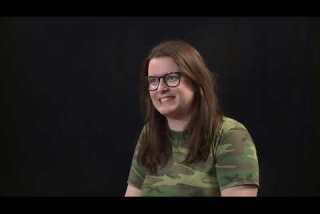
Cast of 'American Gods' drop divine secrets on the new Starz series
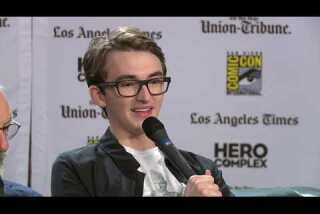
Liam Cunningham and Isaac Hempstead on finding the humor in 'Game of Thrones'
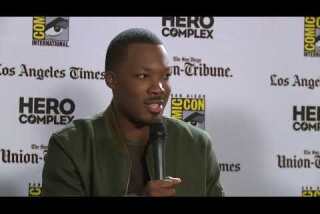
Acting opposite a giant Hollywood monster on 'Kong: Skull Island'
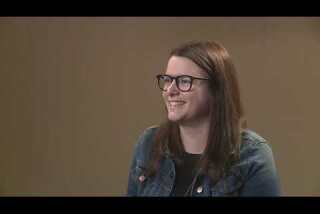
Luc Besson takes us inside his next space odyssey 'Valerian and the City of a Thousand Planets'

Norman Reedus on the secret Walking Dead' cast Comic-Con ritual
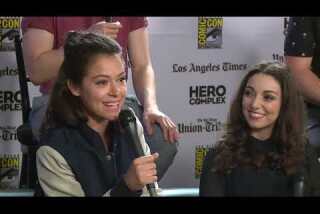
The cast of 'Orphan Black' reveal what they want to see resolved in the series finale
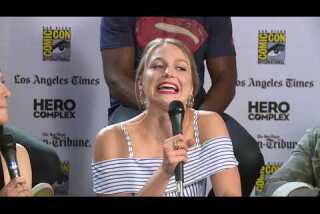
'Supergirl' cast on inspiring little girls to pick up a cape of their own
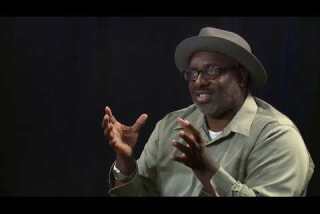
Video: Comic-Con: Wishing there could be a body swap between Fitz and Mac on 'Agents of S.H.I.E.L.D.'...
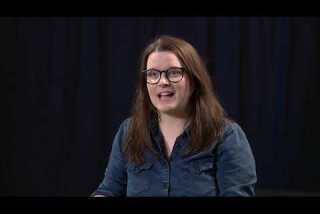
Charlie Hunnam on the hyper-stylized antics of 'King Arthur: Legend of the Sword'
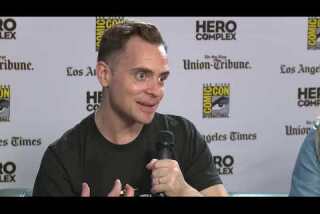
Comic-Con: Ana Gasteyer and Wyatt Cenac on 'People of Earth'
Twitter: @tracycbrown
More to Read
The biggest entertainment stories
Get our big stories about Hollywood, film, television, music, arts, culture and more right in your inbox as soon as they publish.
You may occasionally receive promotional content from the Los Angeles Times.











